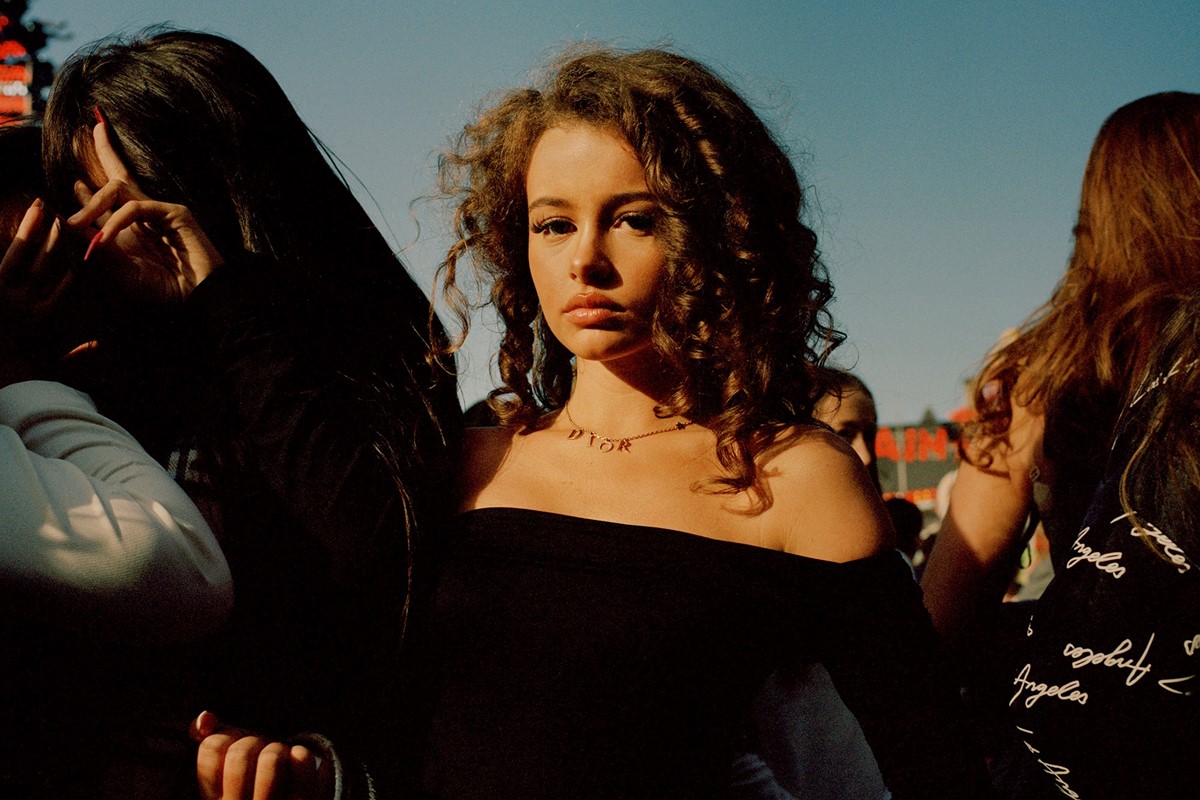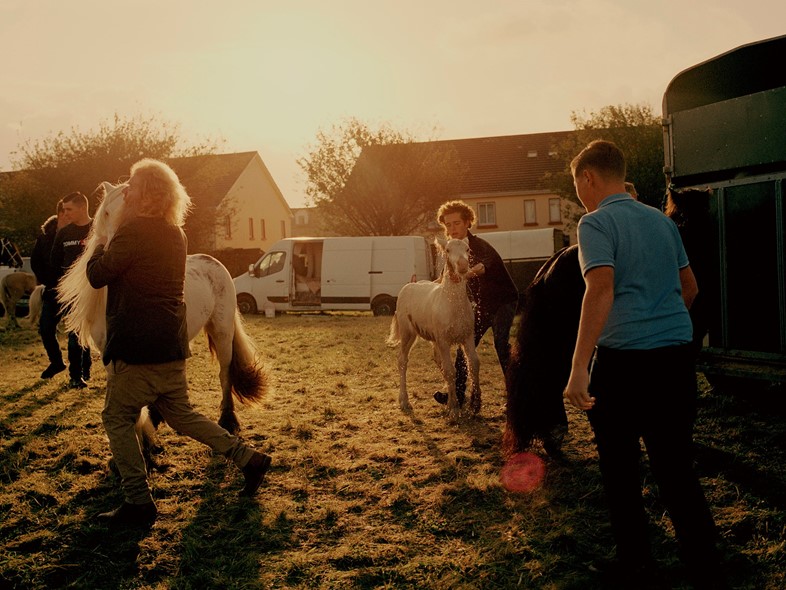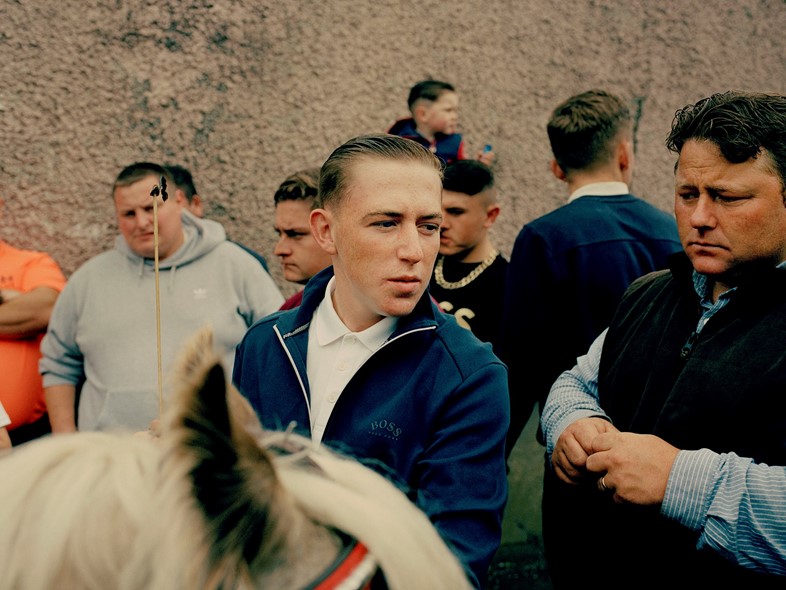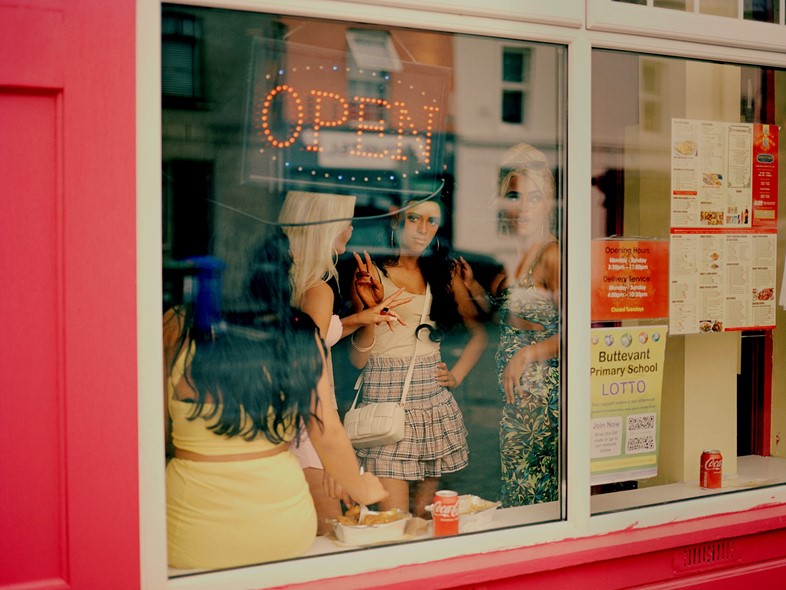
Rewrite
In his own words, Sam Wright talks about creating a proud document of groups that has been marginalised for centuries and unfairly marred by the modern media
There’s a portrait Sheffield-born photographer Sam Wright took in 2018 that sums up his practice perfectly. It’s of a 14-year-old boxer who lost a fight seconds before, holding his flushed head up to the camera as tears swell in his eyes. Capturing a moment of vulnerability in a sport bound in masculine ideas of toughness, the shot – which was shortlisted for the Taylor Wessing Photography Prize – reveals a tender complexity which sits at the heart of Wright’s work. Since he was a teenager, taking his camera to BMX parks and underground punk gigs in the North, he has been committed to showing a more human side to communities that are largely misunderstood.
His new book Pillar To Post is no different, shining a celebratory light on the Traveller and Romany Gypsy communities of the UK. It follows a loving document of Naples (published in 2022), an Italian city often regarded as dangerous, but that Wright captures in all its true, vibrant glory. Launched at Photo Book Cafe in Shoreditch and Village Books in Manchester concurrently, the new project began after Wright learnt that his great-grandmother was forced to denounce her Traveller identity before marriage. This sparked a personal curiosity which led him to Appleby Horse Fair in Cumbria, an event that has been running since 1775 and gathers over 10,000 Travellers annually.
Upon arriving, Wright was instantly moved by the friendly spirit of the community, who welcomed him to shoot them without reservation. The visit to Appleby marked the start of a three-year journey to fairs across Yorkshire, Norfolk, Cumbria, Galway and Cork, where Wright not only photographed Traveller gatherings and celebrations, but also took time to interview people away from the camera. The resulting images present a proud document of a community that has been marginalised for centuries and unfairly marred by the modern media, depicting close intergenerational bonds in lustrous colour portraits that radiate with resilience and joy.
Here, in his own words, Sam Wright speaks on the making of the book.

“I think I’ve always been into the story of the underdog. I’ve tried to connect with lesser celebrated people and show the more beautiful side of their lives. The Gypsy and Traveller communities have been really badly portrayed for centuries. I wanted to tell the true story of the people and show all the richness of the community that isn’t often seen.
“I started at Appleby Horse Fair. It’s a big date in the calendar. Traditionally, these fairs were organised to sell horses and livestock. There’s still a lot of horse dealing that goes on, but now it’s also a place where people can meet friends and see people they’ve not seen for a long time. A few people told me, ‘It’s somewhere we can come and just be ourselves’. There’s no pressure from the government or the police. They’re not getting people shouting at them from the roadside. They’re not getting moved on. It’s a real safe space.
“Before starting the project, everybody said the things that everybody says about Travellers and Gypsies. ‘Don’t go there. They’ll steal your cameras’. That was my first realisation of how widespread the prejudice and racism is towards them. When I got there, they were so welcoming. They were like, ‘Nice to meet you. Come and sit down. Do you want a cup of tea? We’ve just had a granddaughter, could you take a photo?’ It was super beautiful. I’d not mentioned anything to do with my great grandma and the connection there, so I was a complete outsider and made to feel really at home. After Appelby, I felt like it needed more than just one trip. I carried on shooting for two or three years.

“There are so many misconceptions about the Traveller community. The media will focus on incidents of them leaving rubbish or bare knuckle boxing. There’s a bit of that, but it’s a really small fraction. I did quite a lot of interviews without my camera and just sat and spoke to people and recorded the conversations. There were some stories that were quite upsetting. This one boy Benjamin Smith told me he was segregated from the settled kids at school. He got called nasty names by the other students. He just left school and he’s only 12, so that’s his education finished. I thought it was really important to focus on the younger generation. They’re the ones that are at this crossroads with the community, where the modern world meets all of their traditions.
“One of my favourite characters I met is a guy called Benny James. I shot one portrait of him, and after we spoke for two hours. He talked about growing up, the fairs, and how family is super important. He talked about some of the harder things, like not being able to go into pubs, and how there’d be signs reading, ‘No Travellers Welcome’. He ended the conversation saying, ‘I’m a proud Gypsy man’.
“In our conversation, Benny James kept saying, ‘Pillar to post. We’ve been moved from pillar to post.’ It kept coming up. I looked it up later and it means to be moved from place to place in an unceremonious way, which I felt just summed everything up. There are no frills within the community. They’re like, we’re going to carry on and we’re not going to complain about it. They’ve got that resilience.

“I hope the book breaks down a few barriers. The Traveller and Gypsy communities are as much a part of British and Irish [culture] as anyone else. Most of us want to be with our family and have a nice life. With my photography, I want to look for the similarities rather than the differences. I want to show people as people, and not their labels.”
Pillar to Post by Sam Wright is published by Gost Books, and is out now.
in HTML format, including tags, to make it appealing and easy to read for Japanese-speaking readers aged 20 to 40 interested in fashion. Organize the content with appropriate headings and subheadings (h1, h2, h3, h4, h5, h6), translating all text, including headings, into Japanese. Retain any existing
tags from
In his own words, Sam Wright talks about creating a proud document of groups that has been marginalised for centuries and unfairly marred by the modern media
There’s a portrait Sheffield-born photographer Sam Wright took in 2018 that sums up his practice perfectly. It’s of a 14-year-old boxer who lost a fight seconds before, holding his flushed head up to the camera as tears swell in his eyes. Capturing a moment of vulnerability in a sport bound in masculine ideas of toughness, the shot – which was shortlisted for the Taylor Wessing Photography Prize – reveals a tender complexity which sits at the heart of Wright’s work. Since he was a teenager, taking his camera to BMX parks and underground punk gigs in the North, he has been committed to showing a more human side to communities that are largely misunderstood.
His new book Pillar To Post is no different, shining a celebratory light on the Traveller and Romany Gypsy communities of the UK. It follows a loving document of Naples (published in 2022), an Italian city often regarded as dangerous, but that Wright captures in all its true, vibrant glory. Launched at Photo Book Cafe in Shoreditch and Village Books in Manchester concurrently, the new project began after Wright learnt that his great-grandmother was forced to denounce her Traveller identity before marriage. This sparked a personal curiosity which led him to Appleby Horse Fair in Cumbria, an event that has been running since 1775 and gathers over 10,000 Travellers annually.
Upon arriving, Wright was instantly moved by the friendly spirit of the community, who welcomed him to shoot them without reservation. The visit to Appleby marked the start of a three-year journey to fairs across Yorkshire, Norfolk, Cumbria, Galway and Cork, where Wright not only photographed Traveller gatherings and celebrations, but also took time to interview people away from the camera. The resulting images present a proud document of a community that has been marginalised for centuries and unfairly marred by the modern media, depicting close intergenerational bonds in lustrous colour portraits that radiate with resilience and joy.
Here, in his own words, Sam Wright speaks on the making of the book.

“I think I’ve always been into the story of the underdog. I’ve tried to connect with lesser celebrated people and show the more beautiful side of their lives. The Gypsy and Traveller communities have been really badly portrayed for centuries. I wanted to tell the true story of the people and show all the richness of the community that isn’t often seen.
“I started at Appleby Horse Fair. It’s a big date in the calendar. Traditionally, these fairs were organised to sell horses and livestock. There’s still a lot of horse dealing that goes on, but now it’s also a place where people can meet friends and see people they’ve not seen for a long time. A few people told me, ‘It’s somewhere we can come and just be ourselves’. There’s no pressure from the government or the police. They’re not getting people shouting at them from the roadside. They’re not getting moved on. It’s a real safe space.
“Before starting the project, everybody said the things that everybody says about Travellers and Gypsies. ‘Don’t go there. They’ll steal your cameras’. That was my first realisation of how widespread the prejudice and racism is towards them. When I got there, they were so welcoming. They were like, ‘Nice to meet you. Come and sit down. Do you want a cup of tea? We’ve just had a granddaughter, could you take a photo?’ It was super beautiful. I’d not mentioned anything to do with my great grandma and the connection there, so I was a complete outsider and made to feel really at home. After Appelby, I felt like it needed more than just one trip. I carried on shooting for two or three years.

“There are so many misconceptions about the Traveller community. The media will focus on incidents of them leaving rubbish or bare knuckle boxing. There’s a bit of that, but it’s a really small fraction. I did quite a lot of interviews without my camera and just sat and spoke to people and recorded the conversations. There were some stories that were quite upsetting. This one boy Benjamin Smith told me he was segregated from the settled kids at school. He got called nasty names by the other students. He just left school and he’s only 12, so that’s his education finished. I thought it was really important to focus on the younger generation. They’re the ones that are at this crossroads with the community, where the modern world meets all of their traditions.
“One of my favourite characters I met is a guy called Benny James. I shot one portrait of him, and after we spoke for two hours. He talked about growing up, the fairs, and how family is super important. He talked about some of the harder things, like not being able to go into pubs, and how there’d be signs reading, ‘No Travellers Welcome’. He ended the conversation saying, ‘I’m a proud Gypsy man’.
“In our conversation, Benny James kept saying, ‘Pillar to post. We’ve been moved from pillar to post.’ It kept coming up. I looked it up later and it means to be moved from place to place in an unceremonious way, which I felt just summed everything up. There are no frills within the community. They’re like, we’re going to carry on and we’re not going to complain about it. They’ve got that resilience.

“I hope the book breaks down a few barriers. The Traveller and Gypsy communities are as much a part of British and Irish [culture] as anyone else. Most of us want to be with our family and have a nice life. With my photography, I want to look for the similarities rather than the differences. I want to show people as people, and not their labels.”
Pillar to Post by Sam Wright is published by Gost Books, and is out now.
and integrate them seamlessly into the new content without adding new tags. Ensure the new content is fashion-related, written entirely in Japanese, and approximately 1500 words. Conclude with a “結論” section and a well-formatted “よくある質問” section. Avoid including an introduction or a note explaining the process.


